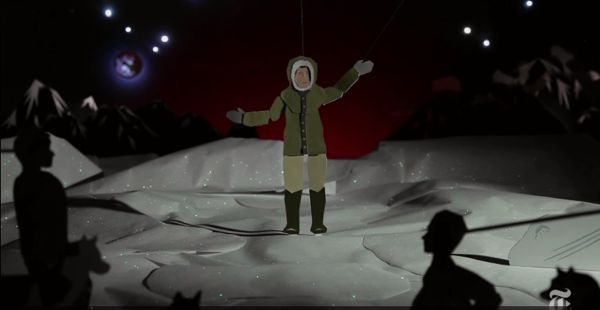“We’re trying to find out how all this works….it doesn’t matter whether we live or die. The important thing is that the work go on”
The New York Times has a wonderful “Op-Docs” feature, a digital animation version of a traditional Op-Ed and a documentary.
Today’s Op-Doc “Pangea”really moved me – it tells the story of polar explorer and scientist Alfred Wegener
The animation and storyline have a sort of enchanting beauty and feel of the “Polar Express”, a superb book I read my young children many times. I strongly recommend you watch the whole thing here.
It is poignant in it’s depiction of a man’s brave and selfless scientific quest (see the quote above).
It managed to convey an inspiring message from another time – almost ancient in its timeless dignity, a compelling contrast with our time of immediate, crass, self-absorbed, individualism and careerism.
And it was interesting and informative on the history of the science of plate tectonics.
The screenshot above is the highlight, where, during a failed expedition, with his companions on the verge of giving up, he inspired his crew with an appeal to wonder and a timeless scientific mission:
At twilight, he said “Let’s go for a walk”
He took them out, and pointed to the ice and the sky, and said: “We’re trying to find out how all this works….it doesn’t matter whether we live or die. The important thing is that the work go on.”
He later died on that expedition. He died an outsider and unrecognized for his ideas, which were rejected by the disciplinary “experts”.
But, one of the things I found most interesting was the (unintentionally) ironic introductory advertisement by Nikon.
Nikon celebrated “Generation Image”.
Many have written about the implications of the decline of literacy and the ascendance of visual culture.
To see a celebration of “Generation Image” juxtaposed with the story of a questing scientist – reflecting values as far from a “selfie” as you could get – led me to think that the more significant “tectonic” shift was not “plate tectonics”, but the shift from a literary to a visual culture.
Something to think about.


Pingback: replicas de camisetas de futbol en espa?a
Pingback: ganate la camiseta dela seleccion argentina
Pingback: camiseta del milan techfit
Pingback: ray ban club master
Pingback: camiseta de chelsea 2013 para pes 2012
Pingback: chelsea nouveau maillot 2013
Pingback: toms sale
Pingback: moncler polo shirt
Pingback: cheap nba jersey
Pingback: nhl jerseys from china
Pingback: dfb trikot home 2014
Pingback: adidas herren trikot fc bayern away
Pingback: original deutschland trikot gr锟斤拷n
Pingback: manchester united custom jersey
Pingback: new real madrid jersey 2015
Pingback: pourquoi maillot bleu espagne
Pingback: louis vuttion 銉偆銉淬偅銉堛兂 銉°兂銈?銉欍儷銉?銈点兂銉併儱銉笺儷 銈ゃ儖銈枫儯銉?40mm 銉儛銉笺偡銉栥儷 銉偠銉?銉栥儵銉冦偗 銉栥儵銈︺兂 m9887 鏂板搧鍚屾 涓彜 銉栥儵銉炽儔
Pingback: TRiXY G26 丕賱兀亘賷囟 丕賱丿丕賳鬲賷賱 丕賱賲乇兀丞 胤賵賷賱丞 丕賱乇丐賵爻 賱 賱丐賱丐 賱賱夭賮丕賮 丕賱夭賷賳丞 丕賱卮賷賮賵賳 3M 丕賱兀亘賷囟 丕賱夭賮丕賮 卮丕賱丕鬲 賷賱鬲賮